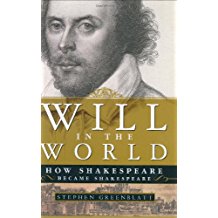Will in the World: How Shakespeare Became Shakespeare, Stephen Greenblatt, 2004
Greenblatt’s masterful and creative exploration of the world that William Shakespeare inhabited from 1564-1616 draws on his imagination and deep historical familiarity with Elizabethan England. From the daily life of rural Stratford to the religious struggles between Protestant Edward VI and Elizabeth and Catholic Mary Tudor, from the handful of legal documents referring to Shakespeare to the history of the theater and its patrons, from the broad changes in English society (printing, literacy, etc) to the particulars of Shakespeare’s life (his father’s downfall from prosperity and status and his straddling of Catholic and Protestant worlds, his mother’s Catholic ancestors, his marriage at 18 to the pregnant and 8 year older Anne Hathaway, his departure for London from Stratford after the birth of his three children, his rapid rise as an actor, playwright, and investor in theatre, his retirement and return to the large house and lands in Stratford, and his will leaving his ‘second best bed’ to his wife), Greenblatt weaves a highly credible story of this man’s life. Filled with phrases such as ‘as seems likely’, ‘might well have been’, ‘one can at least imagine’, ‘could easily have been’, ‘assuming he had one’, ‘let us imagine’, ‘it is at least possible’, and the usual, ‘might have’, ‘could have’, ‘probably’, and perhaps’. A detailed but readable history of Tudor England and the world’s greatest playwright whose themes of restoration, doubleness, radical excision, opacity, aging, and father/daughter relationships contributed to the Bloom’s Creation of the Human.



